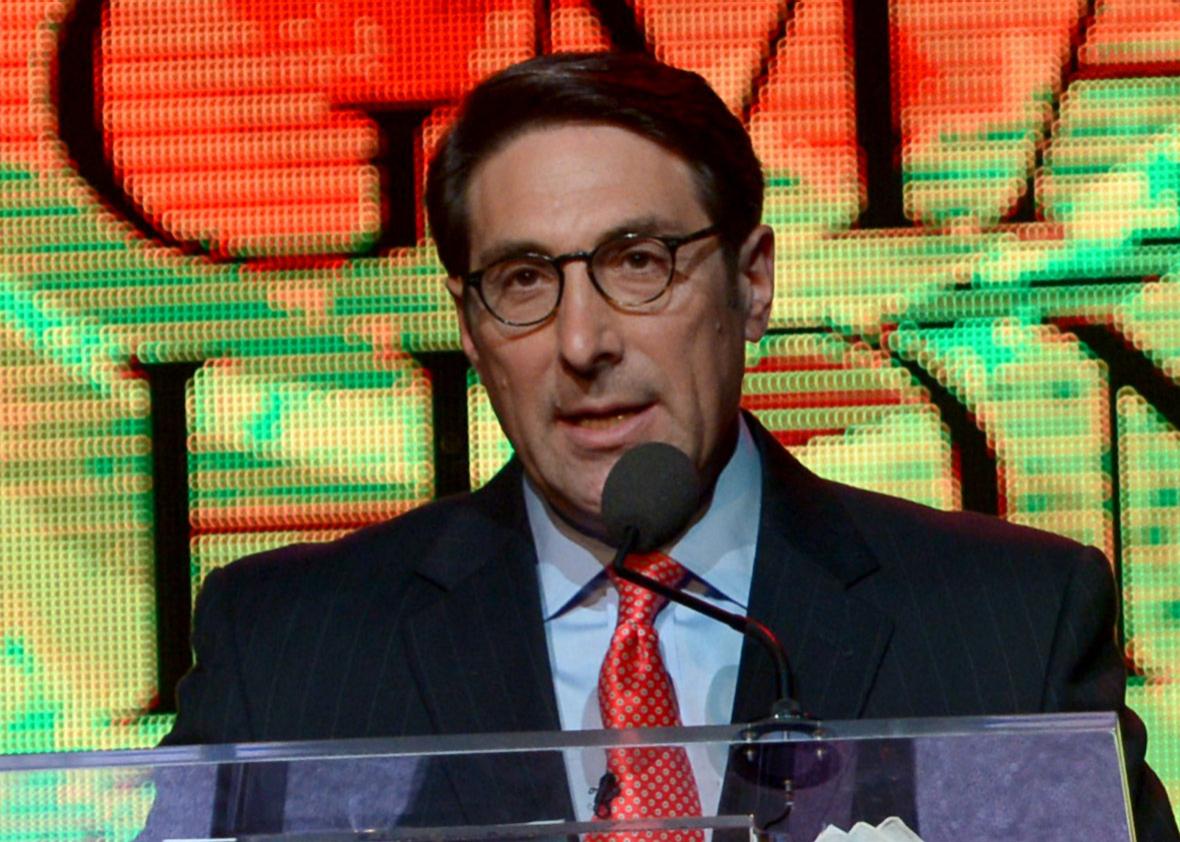Jay Sekulow had one job. He didn’t do it. In fact, he did the opposite. The newest member of Donald Trump’s private legal team, Sekulow was supposed to explain that, counter to the Washington Post’s reporting, the president is not under investigation,. Instead, he told Fox News’ Chris Wallace that Trump is under investigation—twice—before denying he’d said any such thing.
This embarrassing flap raises two questions: Who is Jay Sekulow, and why is he defending Trump?
The first question is more easily answered than the second. Sekulow is a conservative litigator who has spent his career dismantling the constitutional separation of church and state. In 1987, he persuaded the Supreme Court to strike down an ordinance barring Jews for Jesus from proselytizing in Los Angeles International Airport. The issue was close to Sekulow’s heart: Although he was raised Jewish, he became a Messianic Jew while attending Atlanta Baptist College (now Mercer University). As he explained in an essay, Sekulow “commit[ted] [his] life to Jesus” at a performance by the Liberated Wailing Wall, the Jews for Jesus’ music group.
Sekulow served as the Jews for Jesus’ general counsel for several years and founded a nonprofit, Christian Advocates Serving Evangelism, or CASE, to fund his legal work. In 1991, he moved to the American Center for Law & Justice, a conservative Christian advocacy group founded by Pat Robertson to counteract the American Civil Liberties Union. In his capacity as ACLJ chief counsel, Sekulow continued to argue cases at the Supreme Court, usually defending school prayer and government subsidization of religion. Sekulow also repeatedly attacked “buffer zones” around abortion clinics that prevent protesters from accosting women. He lost that fight but won several high-profile religion cases by asserting that restrictions on religion in schools violate freedom of speech.
Sekulow’s profile rose precipitously in the 1990s thanks in large part to Paul and Jan Crouch, owners of the Trinity Broadcast Network. (Jan Crouch, the Los Angeles Times reported in 1993, referred to Sekulow as “our little Jew.”) The Crouches gave him a talk show on the network called Call to Action: Legal Issues Facing Christians Today, a platform that cemented his reputation as a top evangelical attorney. According to the LAT, donations to Sekulow’s nonprofit, CASE, quadrupled after he mentioned it on air.
Over the next 15 years, Sekulow also transformed himself into a minor Republican powerbroker, working with the Bush White House to select conservative judicial nominees and push them through the Senate. In 2005, however, the Legal Times’ Tony Mauro published an investigative piece revealing that Sekulow had “through the ACLJ and a string of interconnected nonprofit and for-profit entities … built a financial empire that generates millions of dollars a year and supports a lavish lifestyle—complete with multiple homes, chauffeur-driven cars, and a private jet that he once used to ferry Supreme Court Justice Antonin Scalia.”
While Sekulow struggled to maintain his image and fundraising capabilities, other groups began to outshine the ACLJ. The Alliance Defending Freedom and the Becket Fund for Religious Liberty, for example, became key players in conservative Christian litigation, creating a network of supporters and donors through more traditional channels. Sekulow retreated from the front lines of church-state lawsuits; he argued his last Supreme Court case in 2008.
But Sekulow and the ACLJ have continued advocating for their peculiar vision of evangelical conservatism. In 2011, the ACLJ—which purports to support “religious and constitutional freedoms”—sued New York to block the construction of what it called the “Ground Zero mosque.” Sekulow, who still serves as the organization’s chief counsel, vocally supported the effort and contributed to both the lawsuit and the appeal. He lost.
In recent years, Sekulow has served as an “informal adviser” to Mitt Romney’s 2012 presidential campaign, hosted a radio show, and contributed to the ACLJ’s blog. He has also used the ACLJ’s resources to promote conservative values in Africa. In 2010, Sekulow and his son set up ACLJ offices in Zimbabwe and Kenya as both countries were in the midst of revising their constitutions. The ACLJ lobbied for the inclusion of constitutional bans on homosexuality, same-sex marriage, and abortion—even in cases where the mother will die unless her pregnancy is terminated. While neither country wrote total bans on abortion or homosexuality into their constitutions, Zimbabwe did include a prohibition on same-sex marriage. (Homosexuality is already illegal in both countries by statute.)
Sekulow’s career arc looks similar to that of a Trump hanger-on like Rudy Giuliani: fame and relevance followed by intense controversy and flagging fortunes that are suddenly reversed by affiliation with the president. Despite this surface resemblance, it might seem odd that Trump hired Sekulow—a First Amendment lawyer—to defend him against possible obstruction of justice charges. But the hire makes sense if Trump views Sekulow as less a litigator than a messenger. While Sekulow may not be an expert in obstruction, impeachment, or executive privilege, he seems to remain popular among the Christian right. His hiring may have been a gesture of goodwill to a group whose support Trump cannot afford to lose.
Whatever logic justified Sekulow’s recruitment was shattered on Sunday, when the fiery culture warrior of the 1990s was reduced to an incoherent propagandist. He tripped and stammered, then grew furious with Wallace, his relatively friendly interlocutor, for noting his contradictory statements. It was a humiliating performance, one that likely disqualified him from future TV appearances. Sekulow’s deflating stint as a surrogate-attorney serves as a reminder that Trump’s habit of hiring unqualified, unprepared advisors doesn’t just hurt the country. Sometimes, it hurts the president, too.
